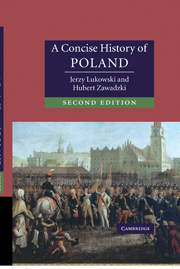Book contents
- Frontmatter
- Contents
- List of illustrations
- Preface to the second edition
- Preface to the first edition
- A note on Polish pronunciation
- Chronology
- PART I POLAND, TO 1795
- PART II POLAND, AFTER 1795
- 4 CHALLENGING THE PARTITIONS, 1795–1864
- 5 AN ERA OF TRANSFORMATION, 1864–1914
- 6 INDEPENDENCE REGAINED AND LOST, 1914–1945
- 7 COMMUNISM AND THE COLD WAR, 1945–1989
- 8 A NEW REPUBLIC, 1989–
- Generalogical charts of Polish rulers
- List of heads of state, presidents, Communist Party leaders (1918–2005)
- Bibliography
- Index
- Title in series
4 - CHALLENGING THE PARTITIONS, 1795–1864
Published online by Cambridge University Press: 05 June 2014
- Frontmatter
- Contents
- List of illustrations
- Preface to the second edition
- Preface to the first edition
- A note on Polish pronunciation
- Chronology
- PART I POLAND, TO 1795
- PART II POLAND, AFTER 1795
- 4 CHALLENGING THE PARTITIONS, 1795–1864
- 5 AN ERA OF TRANSFORMATION, 1864–1914
- 6 INDEPENDENCE REGAINED AND LOST, 1914–1945
- 7 COMMUNISM AND THE COLD WAR, 1945–1989
- 8 A NEW REPUBLIC, 1989–
- Generalogical charts of Polish rulers
- List of heads of state, presidents, Communist Party leaders (1918–2005)
- Bibliography
- Index
- Title in series
Summary
Poland's cultural and civic revival during the reign of Stanislaw August Poniatowski, impressive as it was, was unable to save the Polish state from annihilation in 1795. If anything, by challenging Russia's domination, the Polish reformers had precipitated the very disaster they were desperate to avoid. One can only speculate whether greater patience would have enabled a compliant Poland to survive intact into the nineteenth century under the watchful eye of Empress Catherine's successors, or whether the Napoleonic wars would have dragged Poland, in any case, into some disastrous international quagmire. One way or the other, it is difficult to imagine the Poles escaping unscathed from the upheavals of the Napoleonic period.
Be that as it may, from 1795 until the end of the First World War the extensive lands of the former Polish-Lithuanian Commonwealth remained politically divided and under foreign rule. This long period of partition, punctuated with several heroic but unsuccessful bids for independence, did not destroy Polish high culture or many of the traditions and values of the szlachta, out of whose ranks was to emerge the modern Polish intelligentsia, or indeed the Roman Catholicism which distinguished most Polish-speakers from Protestant Prussians and Orthodox Russians, if not Catholic Austrians. Nevertheless, the different patterns of political, economic and social development of the separate parts of historic Poland were to accentuate regional differences, while the emergence of several mutually exclusive ethnic and linguistic nationalisms was to add a further twist to the complex issue of national identity.
- Type
- Chapter
- Information
- A Concise History of Poland , pp. 135 - 181Publisher: Cambridge University PressPrint publication year: 2006

